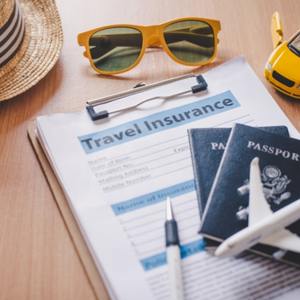
Summer has arrived, and for many of us, that means an upcoming flight, drive, or train ride for a well-deserved vacation. It is a time to relax and enjoy seeing old friends. Travelling with epilepsy can present several issues but it doesn’t have to prevent you from going away, you simply must be aware and prepared. As you begin packing, remember these 5 key seizure safety tips for travelling with epilepsy this summer:
Medications

- Taking extra medication and prescriptions is essential when travelling. Expect the unexpected. For many reasons, you may be stuck in a country for longer than you expect and some countries around the world may not stock your medication.
- Keep your medication in its original box/container and carry them in your carry-on luggage. Do not place it in checked baggage as you may need it onboard, or your luggage may be misplaced, lost, or stolen.
- If you’re travelling with someone else, you may consider giving them some to carry for you as well. Make sure they know where you keep your medications in case you need help.
- Ask your doctor for a duplicate prescription to have on hand, or in a worst-case scenario, they could always call in a prescription for you – make sure you bring their contact information just in case.
- Make sure to continue to take your medications as you normally do which can be tricky with different time zones and being out of your normal routine. Set alarm reminders on your phone to help you stay on track.
Safety

- Travel with someone else or a group, if possible. If you are travelling with other people, you can ask them to support you in staying safe. If you are travelling alone, keep others updated on your travel status and location so someone always knows where you are.
- Wear a medical ID bracelet in case you are unable to communicate, it’s an important and effective way to let medical professionals know about your condition.
- Be extra aware of your triggers when you’re going on holiday and try to avoid them as best as you can. Disrupted sleep, travel stress, heat, missing meals, and drinking alcohol are more likely if you are going away.
- Stay safe. If you wouldn’t normally swim alone, cycle, have late nights or drink alcohol, avoid doing these things while you are away.
- Always have your phone and charger with you in case of emergency.
Research & Planning
- Research hospitals and doctors in and around your destination so you are prepared in the event of a seizure which requires medical assistance. A simple internet search will help with finding appropriate facilities. Enter the phone numbers of hospitals and doctors into your contact list before leaving. In the heat of the moment, finding phone numbers is nerve-wracking and time-consuming.
- Plan everything ahead to try to alleviate added stress. Pack for your trip a few days ahead of time so you get a good night’s sleep before you leave. Allow for extra travel time so you are not rushed.

- Use apps to make travel easier. Smartphones make it easy to do just about anything you need. You can book hotel rooms, cars, and order food if you don’t want to venture out.
Insurance
- Travel insurance is not compulsory, but you don’t want to get caught needing medical assistance without it. You may find it more expensive if you have existing medical conditions, but the consequences can be disastrous without it.

Flying
- If you have a vagus nerve stimulation (VNS) device, they have been known to trigger airport security alarms when you pass through the metal detector. It’s not a cause for concern and it’s something that the airport staff will be aware of. We would simply recommend you make it known to the scanner beforehand as they may choose to scan you with a handheld device instead.
- If you have frequent seizures or you’re travelling alone, let a flight attendant and your seatmates know about your epilepsy and what they can do if you have a seizure.
- If you’re flying or travelling on a train, request an aisle seat to give you a bit more space and make it easier for others to assist you if you happen to have a seizure.
